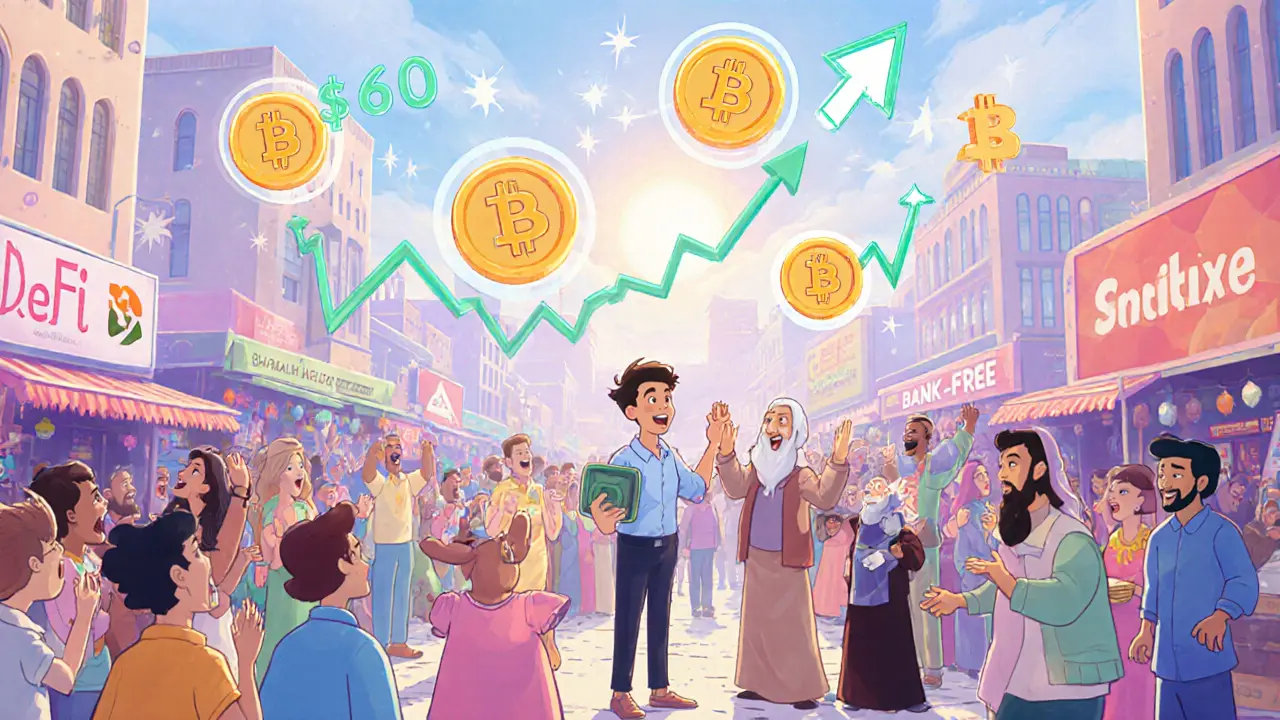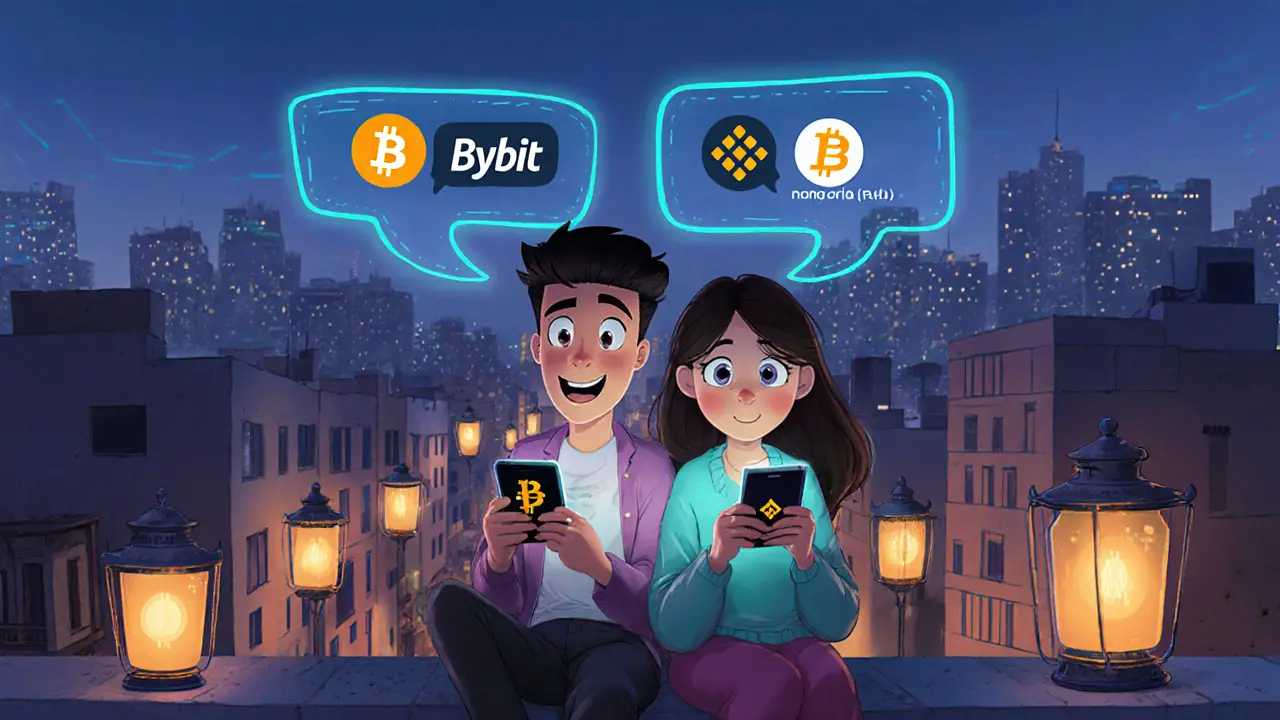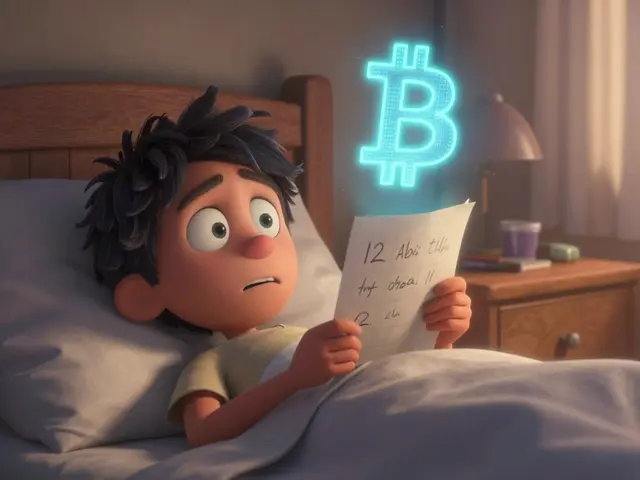Egyptian P2P Crypto Trading Fee Calculator
Calculate your estimated transaction costs when trading cryptocurrency via P2P platforms in Egypt. This tool compares fees across Bybit, Binance, and OKX platforms based on your trade amount in Egyptian Pounds (EGP).
Your Estimated Trade
Based on 100,000 EGP trade amount
Transaction Fee: 0 EGP
Net Amount Received: 100,000 EGP
Transaction Fee: 100 EGP
Net Amount Received: 99,900 EGP
Transaction Fee: 0 EGP
Net Amount Received: 100,000 EGP
When it comes to Egyptian underground crypto trading is a practice where residents exchange digital assets through peer‑to‑peer (P2P) networks to avoid strict banking and regulatory limits, the scene looks very different from the glossy mainstream exchanges you see in Europe or the US. Instead of logging into a local broker, most Egyptians open a chat window, pick a payment method that works with their bank, and trade directly with another user. Below you’ll find everything you need to know - from the legal backdrop that pushed traders underground to the exact steps they take on platforms like Bybit and Binance.
Key Takeaways
- The Central Bank of Egypt’s Law No. 194(2020) bans unlicensed crypto services, forcing traders into P2P markets.
- Bybit P2P and Binance P2P dominate the Egyptian scene because they support the Egyptian pound (EGP) and charge zero transaction fees.
- Security habits such as two‑factor authentication, cold storage, and trusted escrow are non‑negotiable in a gray‑market environment.
- Legal risk remains high - traders can face investigations if they publicize their activity.
- Expect the market to keep growing; estimates point to $690million in revenue by 2025 despite the restrictions.
Why the Underground Exists: The Regulatory Maze
The Central Bank of Egypt (CBE) issued Law No. 194 in 2020, demanding that any crypto‑related service obtain a licence before operating. The law does **not** criminalize owning or trading cryptocurrencies outright, but it makes every domestic exchange illegal without a licence - and the CBE has issued none. Add to that a banking sector that blocks any transaction flagged as “crypto‑related,” and you get a market that has to hide.
Religious rulings have also muddied the waters. Dar al‑Ifta initially branded Bitcoin as haram, yet newer scholars argue it could be permissible if traded responsibly. This split keeps many users on the fence, preferring an anonymous P2P route over a public exchange.
How P2P Platforms Fill the Gap
Peer‑to‑peer marketplaces let users post buy or sell ads, set their own price in EGP, and choose a payment method that works with their bank or mobile wallet. The platform acts only as an escrow: it holds the crypto until the seller confirms receipt of the fiat payment, then releases the assets.
Two platforms dominate:
- Bybit P2P (a global crypto exchange that launched a dedicated P2P hub for Egypt in 2022) - zero transaction fees, Arabic interface, and Shariah‑compliant trading options.
- Binance P2P (the P2P arm of the world’s largest crypto exchange, supporting over 30 payment methods in Egypt) - low fees, extensive KYC support, and instant EGP deposits via local banks.
Both platforms support a range of payment routes: traditional bank transfers, mobile money apps like Fawry, and even cash‑in‑hand for those who meet in person.
Step‑by‑Step: Trading Bitcoin on Bybit P2P
- Sign up on Bybit and complete basic KYC (email, phone verification). Egypt crypto P2P traders often skip the deeper verification because the platform’s escrow protects both sides.
- Navigate to the P2P hub, select “Buy Bitcoin,” and filter ads by “EGP” and “Zero fee.”
- Choose a seller with a high completion rate (≥95%) and a clear payment method you can use.
- Enter the amount of EGP you want to spend. The platform instantly shows the Bitcoin you’ll receive.
- Initiate the trade. Bybit freezes the Bitcoin in escrow and provides the seller’s bank details.
- Transfer the EGP using your bank’s online portal or mobile app. Include the trade ID in the transfer description.
- Once the seller confirms receipt, Bybit releases the Bitcoin to your wallet.
- Move the Bitcoin to a personal cold wallet if you plan to hold long‑term - this adds an extra security layer beyond Bybit’s hot storage.
Every step is logged in the app, so you have a paper trail that can be shown to a lawyer if needed.
Popular Alternatives: Binance, OKX, and International Exchanges
While Bybit leads the market, many traders diversify across platforms to avoid dependence on a single service:
- Binance P2P offers auto‑matchmaking, allowing you to accept the first available seller at market price.
- OKX (a Singapore‑based exchange that provides institutional‑grade P2P desks for large volume traders in Egypt) is favored by firms that need higher limits and deeper liquidity.
- International exchanges like Bitget and Gate.io do not have native P2P hubs but support EGP deposits via third‑party gateways, making them viable for users with established banking workarounds.
Comparison of Top P2P Platforms Used in Egypt
| Feature | Bybit P2P | Binance P2P | OKX P2P |
|---|---|---|---|
| Transaction fee | 0% (zero fee) | 0.1% (minimal) | 0% for volume<5BTC/day |
| Supported fiat | EGP only | EGP, USD, EUR | EGP via partner gateways |
| Payment methods | Bank transfer, mobile money, cash‑in‑person | Bank transfer, Fawry, Vodafone Cash | Bank transfer, PayPal‑linked accounts |
| Security features | 2FA, cold‑storage escrow, Arabic UI | 2FA, device management, insurance fund | Hardware‑wallet integration, anti‑fraud AI |
| Average trade size (EGP) | ≈2,000-10,000 | ≈1,500-8,000 | ≈5,000-20,000 (institutional) |

Risk Management: Staying Safe in a Gray Market
Because there is no local regulator to back you up, you must treat every transaction like a small business deal.
- Verify counterparties. Look for high completion rates, positive reviews, and a verified phone number.
- Use escrow wisely. Never release crypto until you see the payment cleared in your bank statement.
- Keep records. Screenshot chats, save transaction IDs, and store PDFs of bank confirmations. These can be crucial if authorities ever investigate.
- Limit exposure. Trade amounts you can afford to lose; the lack of consumer protection means losses are yours alone.
- Secure your wallets. Enable two‑factor authentication on every exchange, use hardware wallets for long‑term storage, and keep backup phrases offline.
Legal Landscape: What Could Change?
Egypt is experimenting with blockchain for land registries and digital IDs, suggesting the government isn’t entirely hostile to the tech. However, the Central Bank has repeatedly warned that unlicensed crypto services are “illegal activities.” Any softening of the stance would likely come through a licensing framework that still requires stringent AML/KYC checks.
If a licence regime appears, the underground P2P market could either migrate to compliant services or double‑down on anonymity. Traders should monitor announcements from the CBE and keep an eye on local crypto newsletters for early warnings.
Future Outlook: Growth Despite Constraints
Projections from industry analysts put Egypt’s crypto revenue at $690million by 2025, with roughly 11million users. The DeFi sector alone is expected to hit $376.9million in the same year, meaning smart‑contract platforms will likely feed more P2P demand.
Even if the government finally authorizes a domestic exchange, many users will stick with P2P because it offers flexibility, lower fees, and the ability to trade 24/7 without a centralized bottleneck. Expect new P2P services to pop up, especially niche ones that brand themselves as Shariah‑compliant or “bank‑free.”
Frequently Asked Questions
Is crypto trading illegal in Egypt?
The law bans unlicensed crypto services, but owning or trading crypto itself isn’t a criminal offense. Traders operate in a gray area and face legal risk if they’re identified as running an unlicensed exchange.
Which P2P platform has the lowest fees for Egyptians?
Bybit P2P advertises a 0% transaction fee for EGP trades, making it the cheapest option. Binance charges a tiny 0.1% fee, which is still low compared to traditional exchanges.
Can I use a credit card to buy crypto on these platforms?
Both Bybit and Binance allow credit‑card top‑ups, but the card transaction is first converted to EGP via a payment gateway. Some banks block “crypto‑related” card purchases, so success varies.
How do I protect myself from scams?
Check the seller’s completion rate, read reviews, and always use the platform’s escrow. Avoid direct cash‑handovers unless you know the person personally.
Will the Central Bank ever legalize crypto exchanges?
There are no concrete plans yet. The CBE is watching blockchain projects for administrative use, but it still treats unlicensed crypto activities as illegal. A future licensing framework could appear, but traders should stay prepared for the status quo.




15 Comments
Kevin Duffy
Wow, this deep‑dive into Egypt’s P2P scene is super insightful! 🚀 It’s amazing how platforms like Bybit can keep fees at zero while still offering solid escrow protection. Keep the good stuff coming! 😊
Tayla Williams
While the article presents useful data, it omits the ethical ramifications of evading regulatory frameworks. Such practices may, defiinitely, undermine the integrity of the financial system and set a dangerous precedent for other jurisdictions. The moral responsibility of traders should not be ignored.
Brian Elliot
The step‑by‑step guide really helps newcomers understand the process without feeling overwhelmed. It’s good to see the emphasis on two‑factor authentication and cold storage as essential security measures. Also, the mention of keeping a paper trail is practical for legal transparency. Overall, a balanced overview.
Della Amalya
Reading this feels like stepping into a hidden world where ingenuity meets necessity. The way Bybit and Binance adapt to local constraints is nothing short of theatrical brilliance. Users navigate a maze of banks, mobile wallets, and cash‑hand‑offs, all while staying under the radar. The article captures that drama perfectly, highlighting both risk and opportunity. It’s a compelling narrative of modern finance.
Teagan Beck
Cool breakdown, love how they listed the payment methods. Makes it way easier to decide which platform works for me. Thanks for the heads‑up on the escrow stuff.
Kim Evans
Great points above! Just a heads‑up: always double‑check the seller’s completion rate before you hit “Buy.” A rate above 95 % usually means they’re reliable and won’t ghost you. Also, keep the trade ID in your transfer description – it speeds up verification. If the seller asks for an off‑platform payment, that’s a red flag 🚩. Use the built‑in chat to confirm details and never share your wallet private keys. Finally, once you’ve received the crypto, move it to a cold wallet for long‑term safety. Hope this helps! 😊
Steve Cabe
Honestly, it’s baffling that Egyptian authorities pretend to protect citizens while blocking legitimate innovation. The US has long championed financial freedom; we should applaud those who find workarounds rather than condemn them. These platforms empower individuals, and that’s something to be proud of.
shirley morales
Bybit’s zero‑fee model is absurdly generous. Binance’s 0.1 % fee is a joke.
Mandy Hawks
One could argue that the underground nature of this market reflects a deeper societal yearning for autonomy. When institutions constrain personal agency, people inevitably seek alternative pathways. The resilience shown here is, in a sense, a philosophical statement about freedom.
Scott G
I appreciate the thoroughness of the procedural outline. The emphasis on legal documentation is particularly noteworthy for risk‑averse participants. It also underscores the importance of maintaining a clear audit trail. This approach aligns well with best practices in compliance and governance.
VEL MURUGAN
Adding to Kim’s advice, consider using a VPN when accessing P2P platforms. It masks your IP and adds another layer of privacy, which is crucial given the banking restrictions in Egypt. Also, monitor the platform’s escrow release times; delays can sometimes be a tactic for phishing. Always verify the transaction hash on a block explorer before confirming receipt. These extra steps can save you from unwanted headaches.
Millsaps Crista
Steve raises a solid point about empowerment, but let’s also remember that education is key. If you’re new to crypto, start with small amounts to test the waters and get comfortable with the platform’s UI. Consistency in applying security measures like 2FA will build confidence over time. Keep pushing forward, and the market will reward your diligence!
Matthew Homewood
Shirley’s critique of fees brings up an interesting economic angle. Zero‑fee structures can attract volume but may hide other costs, such as wider spreads or mandatory conversion fees. Users should calculate total cost of ownership, not just headline percentages. Understanding the hidden economics ensures smarter trading decisions.
Bruce Safford
Honestly, the whole “underground” narrative is just a distraction. What nobody tells you is that most of these P2P deals are funneled through a shadow network linked to global intelligence agencies. They monitor every transaction, and the “zero fee” is just a lure to keep you hooked while they harvest data. Stay alert.
Andrew Mc Adam
When I first read about the Egyptian P2P landscape, I was struck by the raw, unfiltered energy pulsing through every trade. The image of a lone trader typing frantically into a chat window, heart hammering as the escrow timer ticks, is almost cinematic. Yet beneath that drama lies a profound lesson about adaptability in the face of oppressive regulation. These platforms are not merely tools; they are lifelines, weaving together a community bound by trust rather than by law. Every successful escrow release feels like a small victory against a system that tries to stifle innovation. The fact that Bybit can offer zero fees is not just a marketing gimmick-it symbolizes a rebellion against the traditional banking grind. Binance’s modest 0.1 % fee, while seemingly trivial, reflects a compromise between profit and accessibility. Users who move their crypto to cold wallets embody the timeless archetype of the guardian of treasure, protecting wealth from unseen marauders. Moreover, the careful documentation of each transaction creates an archival tapestry that could one day serve as evidence in a courtroom. This meticulous record‑keeping is a silent shield, reminding us that even in the shadows, accountability matters. The cultural tension between religious rulings and modern finance adds another layer of complexity, forcing traders to navigate moral waters as treacherous as any sea. In this evolving ecosystem, education becomes the beacon that guides newcomers away from pitfalls. By fostering inclusive mentorship, seasoned traders can illuminate the path, ensuring the community does not fracture under pressure. Remember, every piece of advice shared-whether about escrow verification or the importance of using VPNs-adds a brick to the foundation of a more resilient market. So, as you dive deeper into this underground world, carry with you the optimism that each trade, each lesson, each shared tip, builds a future where freedom of exchange is not a whispered secret but an open anthem.